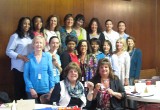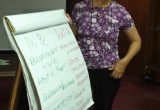First Students Graduate from PULSE of NY Patient Safety Advocate Training Course
Online, June 1, 2014 (Newswire.com) - 16 people graduated from PULSE of NY's inaugural Patient Safety Advocate Training class held in Freeport NY on May nineteenth.
Participants included nurses, managed care experts, and people who have never worked in healthcare. All graduates had an opportunity to fill out an application for potential employment with At Home Senior Homecare in Wantagh. http://athomeseniorcare.com/
This 12-hour course covered the PULSE of NY standard four-hour training, called Family Centered Patient Advocacy, that focuses on reducing falls, infections, surgery and medication errors, and improving health literacy and communication skills. Additional training covered HIPAA, privacy, ethics, advance directives, improving diagnosis through communication, and the complaint process. Some of this was done with small work groups and role-play.
PULSE of NY works with vulnerable populations through the LI Patient Safety Advisory Council (http://www.patientsafetyadvisorycouncil.org), and participants had opportunities to learn from actual experiences that involved PULSE of NY, such as watching a video of a transgender man's story of having his hospital room changed because staff did not know how to categorize him. Participants at their tables broke out into roles of the advocate, the family and the nurse in charge, to see how the advocate might get everyone's needs met.
Other role play opportunities involved a patient who wanted to go home but was delayed, an impatient clinician with a consent form, and a patient who was being dishonest with the team about her lifestyle before she was about to have surgery.
"So many problems happen around communication," said Ilene Corina who developed the training and is one of the three instructors. "If people understand how problems happen, we can be more active in avoiding them."
PULSE of NY regularly uses the Ask Me 3 formula from the National Patient Safety Foundation, which suggests questions for patients to ask at every visit with their clinician: 1: What is my main problem? 2: What do I need to do? And 3: Why is it important for me to do this? "These questions can be used to start the conversation between the patient and clinician, especially if a patient is nervous and forgets what to ask," explains Corina.
Dr. Leslie Farrington, a gynecologist from Freeport who also helped develop the training and is a board member of PULSE, explained to the group, "I can be a better healer or diagnostician if my patient can give me a good description of what she is experiencing. A vague or exaggerated complaint can be misleading."
Part of the communication training focused on a new tool from PULSE of NY called STARS, which stands for:
Specifics - Specific location of pain and what you were doing before it started.
Treatment - Are you taking medication, are you on a new medication, do you know the names and doses of your medication? Are you treating the pain with heat or cold?
Associated Symptoms - Dizziness, racing heart, bleeding, nausea or vomiting?
Relieve or provoke the symptoms - What makes it feel better, or worse?
Severity - On a scale of 1-10, 10 being the worst, how are you affected?
Andrea Goldstein R.N., M.S., who works for a NY State Medicare/Federal Health Care quality assessment organization, recognizes the need for patient involvement for better outcomes. She discussed several areas of hospital policy including the complaint process, and where advocates or their families might go to get help — such as the titles of people who work in the hospital, or where to file a complaint. "Very often the family is too close to the situation and needs to reach out to an advocate if things are going downhill for the patient," Goldstein told the group as she shared her own experience of needing an advocate, even with all her skills.
"The three-day Intense Patient Advocacy Training recently provided by PULSE of NY was excellent," said Eva O'Brien, RN, CCM, CHPN, the owner of Adept Care Consultant Organizer of Medical Information. "The presenters were knowledgeable and experienced. The information was relevant for lay people as well as professionals. The format was organized enough to be complete and informal enough to allow for meaningful dialogue. Everyone should take this course."
To learn more about the training or to register for the next one, call (516) 579-4711 or check out the PULSE of NY website www.pulseofny.org and go to Family Centered Patient Advocacy Training.


